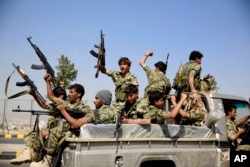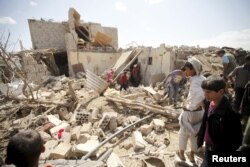Yemen's government walked out of U.N.-sponsored peace talks with Houthi rebels Tuesday, accusing them of having "contempt" for the peace process.
Yemeni Foreign Minister Abdul-Malik al-Mekhlafi called the talks in Kuwait "a waste of time." He said the Houthis insist on power-sharing instead of abiding by a Security Council resolution that says such matters need to be negotiated.
The minister accuses the Houthis of violating a cease-fire in Yemen and using the talks as a chance to stall and rearm themselves.
The rebels have not yet responded to the suspension of peace talks.
The Iranian-backed Houthis seized the capital, Sana'a, in 2014, forcing the internationally recognized Yemeni government to flee to Saudi Arabia before returning to set up in the port city of Aden.
The fighting on the ground in Yemen and Saudi-led airstrikes on the Houthis have created a humanitarian catastrophe, with the U.N. saying 80 percent of Yemeni civilians urgently need food and medical help.
Lack of global response
A top U.N. aid official Tuesday called the global response to help Yemen "shockingly low."
John Ging told reporters in New York that the Yemen Humanitarian Response Plan has gotten only 16 percent of the $1.8 billion in needs for 2016.
He said Yemenis are dying from diseases that are easily preventable by just basic medical supplies. And he made a direct appeal to all sides in Yemen to make protecting civilians their priority.
"The people of Yemen must be at the center of this response, and our collective duty is to protect them and provide them with food, health, shelter and other vital support."






